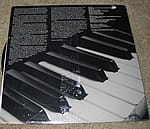|
Album jacket notes:
 A Renaissance Man is one who is
artistically gifted and able to express his gifts in abundant manners. The
type of man is rare; our age, the age of specialization, hasn't produced many of
note, but Don Shirley is definitely a contender for the title. In addition
to his Doctorate in Music, he hold Doctorates in Psychology and Liturgical Arts,
speaks eight languages fluently and paints expertly. A Renaissance Man is one who is
artistically gifted and able to express his gifts in abundant manners. The
type of man is rare; our age, the age of specialization, hasn't produced many of
note, but Don Shirley is definitely a contender for the title. In addition
to his Doctorate in Music, he hold Doctorates in Psychology and Liturgical Arts,
speaks eight languages fluently and paints expertly.
In is impossible to categorize Don
Shirley's music. It is possible to say that as an arranger-composer he
treats each price of music as a new composition, not just an arrangement.
Don plays Standards in a non-standard way. He is a virtuoso, playing
everything from Show tunes to ballads to his personal arrangements of Negro
spirituals to jazz, and always with the overtone of classically trained musician
who has utmost respect for the music he is playing.
His rendition of Cole Porter's "Love
for Sale" is the most sensitive production of that poignant song, as well as the
most exciting that I have ever heard. The key to the reason why Don is
such an exciting player is that he plays to a sense of truth about each song he
does; he goes right to the heart of the song and the listener immediately
reacts, saying to himself, "Yes, that is the way that song should be played!"
His sense of shading, phrasing, and balance with his piano is equal to the sense
that Billie Holiday is renowned for with her voice. Igor Stravinsky has
said of him, "His virtuosity is worthy of the Gods."
Don's piano style is basically
attributed to his using the piano as a stringed instrument rather than a
percussion instrument which enables him to have a flexible, subtle voice.
He has said, "There are three ways to enjoy or to interpret music, from a
listening point of view: emotionally, intellectually, and a combination of the
two." I think the latter of the three would make for the most satisfying
listening pleasure, and Don's work has consistently made me appreciate the music
in an emotional and intellectual way.
Don is a a native of Kingston, Jamaica.
He has referred to the key of "B Major" as being the lovely blue of Turquoise
Bay. he began playing piano at the age of 2 1/2 and made his first public
performance at the age of 3. By the time he was 9 he had been invited to
study at the Leningrad Conservatory, where he spent a great part of his youth.
However, he abandoned the piano when he was still quite young even though he had
a great deal of success both in Europe and the United States.
It was be serendipity that Don got back
into music. He was given a grant while teaching Psychology at the
University of Chicago in the early 50's to study the relationship, if any,
between music and the juvenile crime wave that had recently erupted in new York.
he proved that certain tonal combinations affected the audience's reactions.
No one in the audience, except some of his students who were planted to help
with the project, knew of the experiment, but the small club became known for
employing an excellent pianist. The "pianist" started making appearances
in New York, most notably at the Basin Street, where he played with Duke
Ellington. They cultivated a warm friendship, the pinnacle of which was
Don's performance of Duke's Piano Concerto at Carnegie Hall with the NBC
Symphony of the Air.
This Renaissance Man has composed three
symphonies, two piano concerti, a cello concerto, three string quartets, a
one-act opera, and works for organ, piano, and violin. A piece of work
that most people can't even read captured Don's imagination and inspired him to
write a tone poem: the work, James Joyce's "Finnegan's Wake." Don has also
written a set of "Variations" on the legend of Orpheus in the Underworld.
You'll remember that Orpheus was the god of music, though he was half mortal,
and he journeyed to the Underworld to rescue his love.
Don Shirley, the man and the musician,
has reached the heights of immortality through his music, while, like Orpheus,
he is most decidedly "human." The work enclosed in this sleeve will certainly
attest to that fusion and lift the listener up to ecstatic heights.
Rebecca Celebreeze |

